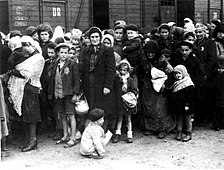
Back والتر بوخ Arabic والتر بوخ ARZ Walter Buch Breton Walter Buch Danish Walter Buch German Βάλτερ Μπουχ Greek Walter Buch Spanish Walter Buch French Walter Buch ID Walter Buch Italian
Walter Buch | |
|---|---|
 Buch in 1933 | |
| Chairman of the Supreme Party Court[a] | |
| In office 27 November 1927 – 8 May 1945 | |
| Führer | Adolf Hitler |
| Preceded by | Bruno Heinemann |
| Succeeded by | Office abolished |
| Personal details | |
| Born | 24 October 1883 Bruchsal, Grand Duchy of Baden, German Empire |
| Died | 12 September 1949 (aged 65) Schondorf am Ammersee, Bavaria, West Germany |
| Resting place | Friedhof St. Johannes Baptist, Inning am Ammersee, Bavaria, Germany |
| Political party | Nazi Party |
| Other political affiliations | German National People's Party |
| Relatives | Martin Bormann (son-in-law) Martin Adolf Bormann (grandson) |
| Profession |
|
| Military service | |
| Allegiance | German Empire |
| Branch/service | Imperial German Army |
| Years of service | 1902–1918 |
| Rank | Major |
| Unit | Infantry Regiment 114 Infantry Regiment 57 Infantry Regiment 112 |
| Battles/wars | World War I |
| Awards | Iron Cross, 1st and 2nd Class |
| |
| Part of a series on |
| The Holocaust |
|---|
 |
Walter Buch (24 October 1883 – 12 September 1949) was a German jurist as well as an SA and SS official during the Nazi era. He was Martin Bormann's father-in-law. As head of the Supreme Party Court, he was an important Party official. However, due to his insistence on prosecuting major Party figures on moral issues, he alienated Adolf Hitler, and his power and influence gradually diminished into insignificance. After the end of the Second World War in Europe, Buch was classified as a major regime functionary or Hauptschuldiger in the denazification proceedings in 1948. On 12 September 1949, he committed suicide.